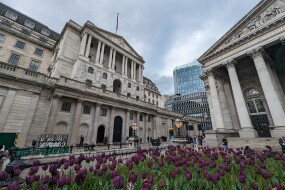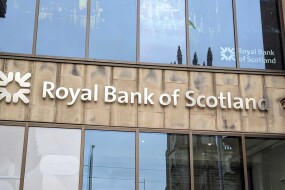The UK's Consumer Price Index (CPI) inflation has remained unchanged at 4% in January.
Economy
The UK economy has taken a significant hit since leaving the European Union, according to a report by Goldman Sachs.
Scotland's listed companies experienced a notable increase in profit warnings during Q4 2023, surpassing the combined warnings of the entire preceding year, as revealed by EY-Parthenon's latest Profit Warnings report. Ten profit warnings were issued in 2023, with six in Q4 alone. The number of Q4 wa
The latest Royal Bank of Scotland Purchasing Managers' Index (PMI) has reported positive signs for the Scottish private sector, indicating a rebound in business activity at the beginning of the year. With a notable increase from 49.4 in December to 51.7, the index highlighted the first expansion in
The start of 2024 has experienced a drop in recruitment activity across Scotland, as signalled by the latest Royal Bank of Scotland Report on Jobs survey. Both permanent staff placements and temp billings fell sharply in January, with the latter posting the first decline in three months. Subdue
The Scottish economy is poised for a turnaround in 2024 after experiencing limited growth in 2023, as reported by the Fraser of Allander Institute at the University of Strathclyde. In the quarterly Deloitte-sponsored Economic Commentary, which includes an assessment of all the latest key data on the
Scotland’s economy is set to gain momentum this year with the prospect of interest rate cuts from May onwards, a continuing fall in inflation, and decreasing energy prices. Continued growth in pay and easing pressure on household finances should also boost consumer sentiment, according to the
Some 18.2% of UK-listed companies issued profit warnings in 2023, surpassing the levels witnessed during the 2008 financial crisis, as indicated by EY-Parthenon's latest Profit Warnings report. In total, 294 profit warnings were issued in 2023, a small decrease of 11 from 2022 when 305 warnings were
Scotland's onshore GDP faced a marginal contraction of 0.1% in November, a slight improvement from the revised figure of -0.6% in October 2023, according to the latest data announced by the chief statistician.
UK inflation experienced an 0.1% increase in December, breaking a 10-month streak of decline. Consumer prices rose at an annual rate of 4%, surpassing both the previous month's figure of 3.9% and economists' expectations of 3.8%, according to the Office for National Statistics (ONS).
There were 108 company insolvencies registered in Scotland in December 2023, 5% lower than the number in December 2022, according to the latest official statistics. This was comprised of 40 compulsory liquidations, 65 CVLs and three administrations. There were no CVAs or receivership appointments.
The contribution of the Scotch whisky industry to the UK economy reached £7.1 billion in 2022, according to a new report by the Scotch Whisky Association (SWA).
The latest Royal Bank of Scotland PMI has revealed a further decline in the Scottish private sector at the close of 2023.
The financial repercussions of Brexit have been projected to reach a loss of £311 billion by the mid-2030s, a new report has revealed.
The UK economy demonstrated resilience in November, rebounding with a 0.3% month-on-month growth, countering the previous month's decline.





















